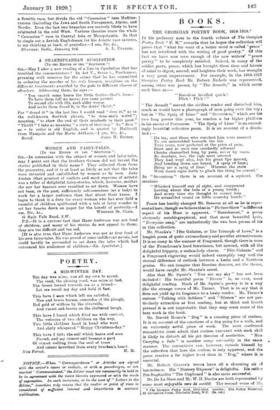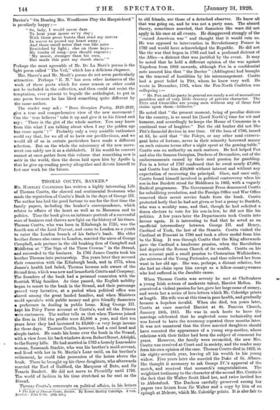BOOKS.
THE GEORGIAN POETRY BOOK, 1918-1919.*
IN his prefatory note to the fourth volume of The Georgian Poetry Book "E. M." remarks that he hopes the collection will prove that "what for want of a better word is called ' peace ' has not interfered with the writing of good poetry." Of this fact we have now seen enough of the new writers' "peace poetry" to be completely satisfied. Indeed, in many of the soldier poets, peace, which has brought them time and leisure of mind to digest, amend, and heighten their work, has wrought a very great improvement. For example, in the 1916-1917 Georgian Poetry Book Mr. Robert Nichols was represented,
among other war poems, by "The Assault," in which occur such lines as
"Revolver levelled quick ! Flick ! Flick ! "
"The Assault" moved the civilian reader and disturbed him„ much as would have a photograph of men going over the top but in "The Sprig of Limo" and "Seventeen." which arc his two long poems this year, he reaches a far higher platform
in his ascent of Parnassus. "The Sprig of Limo" is an exceed- ingly beautiful reflective poem. It is an account of a death-
bed:— "He lay, and those who watched him were amazed
To see unheralded beneath the lids
Twin tears, new gathered at the price of pain,
Start and at once run crookedly athwart Cheeks channelled long by pain, never by tears. So desolate, too, the sigh next uttered They had wept also, but his great lips moved, And bending down one heard, A sprig of lime ;
Bring me a sprig of lime.' Whereat she stole With dumb signs forth to pluck the thing he craved."
In " Seventeen " there is an account of a squirrel. The oreature "Whisked himself out of sight, and reappeared Leering about the bole of a young beech ; And every time she thought to corner him He scrambled round on little scratchy hands."
Peace has hardly changed Mr. Bassoon at all as he is repre- sented here, though we believe that in" Picture Show" a different aspect of his Muse is apparent. "Banishment," a poem obviously autobiographical, and that most beautiful lyric, "Everyone sang," are undoubtedly the two best poems of his in this collection.
Mr. Shanks's "Fête Galante, or The Triumph of Love," is a
longish poem of quite extraordinary and peculiar attractiveness. It is an essay in the manner of Fragonard, though there is none of the Frenchman's hard luxuriance, but instead, with all the delightful frippery, a melancholy charm. "Rate Galante" and a Fragonard engraving would indeed exemplify very well the
eternal difference of outlook between a Latin and a Northern genius. We can imagine that Russian dancers, set the theme, would have caught Mr. Shanks's mood.
Alas that Mr. Squire's "You are my sky" has not been
included ! His beautiful. poem " Rivers " is, as ever, most delightful reading. Much of Mr. Squire's poetry is in a way like the strange verses of Mr. Turner. That is to say that it does not yield up its fragrance to a hasty reader. Mr. Turner's curious "Talking with Soldiers" and " Silence " are not par- ticularly attractive at first reading, but at third and fourth perusal it is not improbable that they may seem some of the
best work in the book.
Mr. Harold Monro's " Dog " is a cunning piece of realism. It is an account of the emotions of a dog going for a walk, and an extremely artful piece of work. The most confirmed romanticist must admit that realism executed with such skill is likely to disturb all his pet theories of aesthetics. "Man Carrying a Bale" is another essay ostensibly in the same manner. The romanticist can, however, console himself by the reflection that hero the realism is only apparent, and the
poem reaches a far higher level than in "Dog," where it is essential.
Mr. Robert Graves's verses have all a charming air of
insouciance. His "Nursery Rhymes" is delightful. His rather Pre-Raphaelite "The Cupboard" Is also most succesduL
Mr. De La Mare and Mr. W. H. Davies are both represented by some most enjoyable tiers cis socidie. The second verse of Mr.
• Ths Georgian Poetry Book, 1918-1910. Leaden: The Poetry Booltelivp, 36 Devonshire Street, Theobelds Road. W.O. [es. net4
Davies's "On Hearing Mrs. Woodhouse Play the Harpsichord" is peculiarly happy.:— " So, lady, I would never dare To hear your music ev'ry day ; With those great bursts that send my nerves In waves to pound my heart away ; And those small notes that run like mice Bewitched by light ; else on those keys-- My tombs of song—you should engrave; 'My music, stronger than his own, Has made this poet my dumb slave.'" Perhaps the most agreeable of Mr. Da La Mare's poems is the light poem called "The Veil," which has a delicious elegance.
Mrs. Shove's and Mr. Moult's poems do not seem particularly attractive. Perhaps "E. M." has seen other instances of the work of these poets which for some reason or other could not be included in the collection, and then could not resist the temptation, ever present to beguile the anthologist, to put in one poem because he has liked something quite different by the same author.
The reader may ask : "Does Georgian Poetry, 1918-1919, give a true and comprehensive view of the new movement ? Can the 'true believer' take it up and give it to his friend and say : 'There is the gist of the whole matter. You may know from this what I am talking about when I say the golden age has come again' ? " Probably only a very amiable enthusiast could say that, for we all of us have our predilections, and we would all of us in certain particulars have made a different selection. But on the whole the missionary of the new move- ment can safely use it as a shibboleth. If his would-be convert
cannot at once gather from this volume that something new is astir in the world, then the doom laid upon him by Apollo is
that he give up reading poetry altogether and devote himself to fret-saw work for the future.



































 Previous page
Previous page